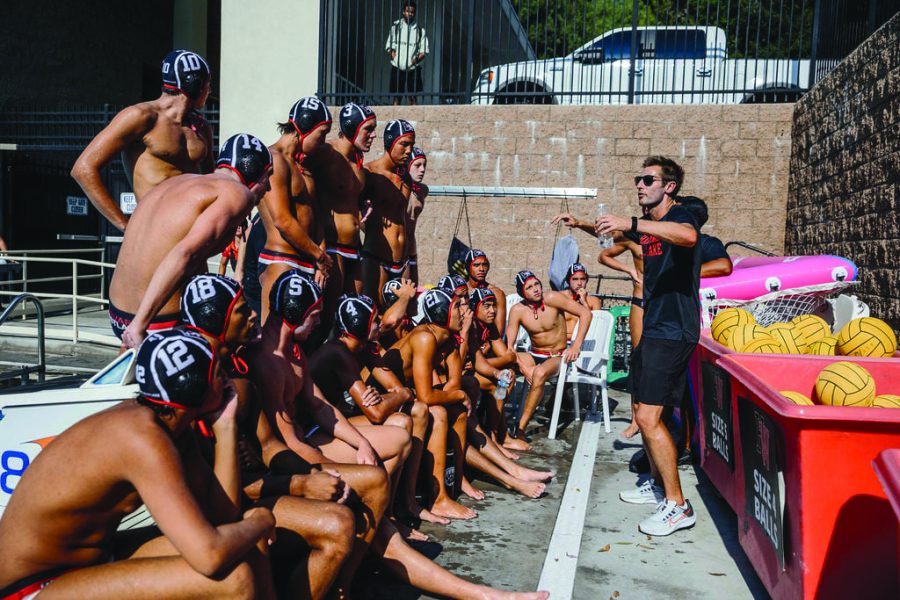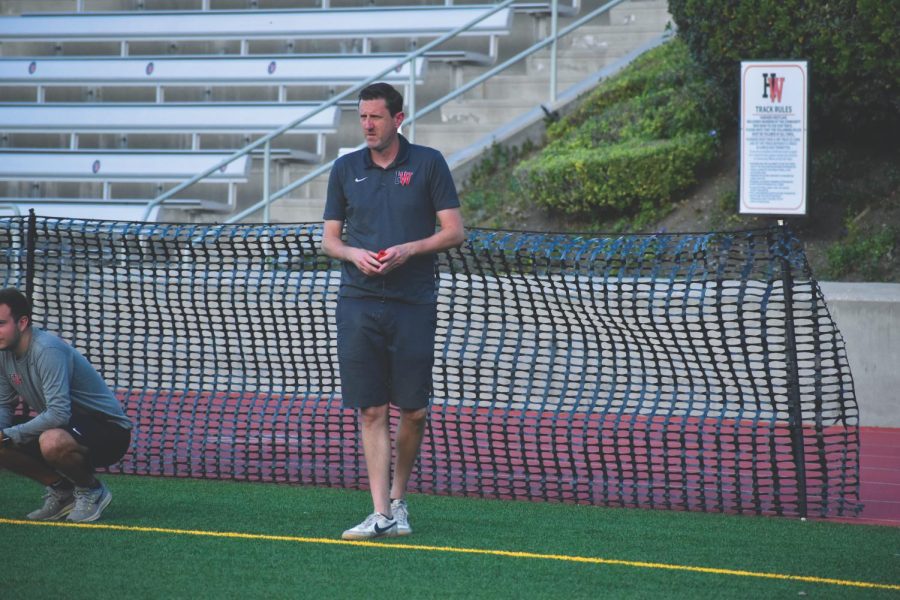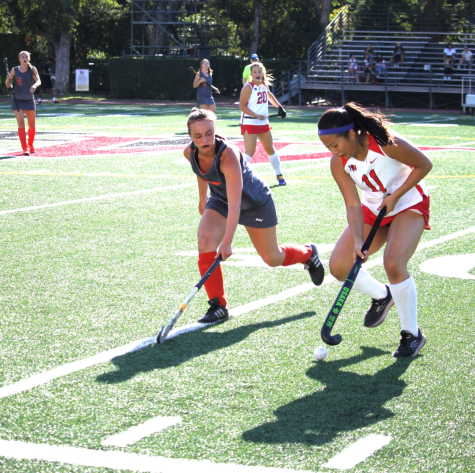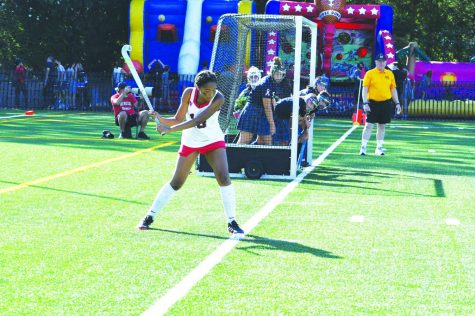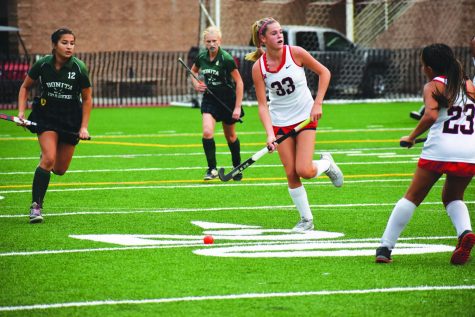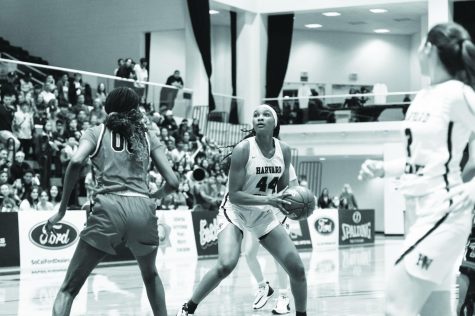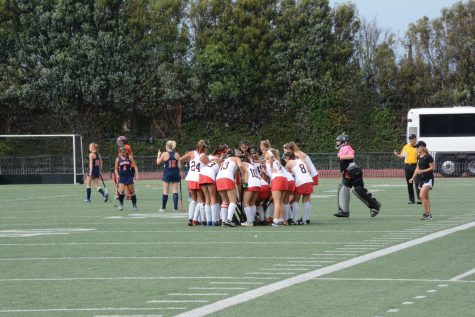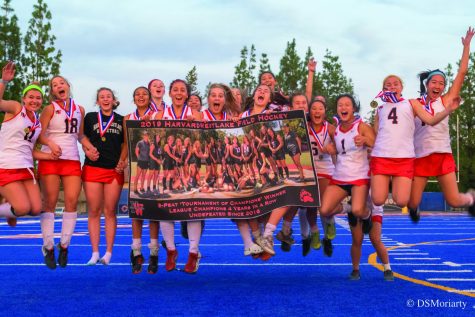Deconstructing championship teams
Boys Water Polo Program Head Brian Flacks gives feedback to his team during halftime.
February 17, 2022
As outside hitter Ava Lange ’23 tied a bandana around her eyes to begin her pregame ritual, she felt the hands of her teammates guiding her way. She listened for a voice to follow before starting her way through the obstacle course composed of volleyballs and workout gear. Lange said these unique pregame trust exercises are fundamental to building strong team chemistry.
“It is very important to a team dynamic to instill trusting relationships,” Lange said. “Before games, we like to do exercises where we have to depend on our teammates for guidance. Even though it feels so separate from volleyball, it really mimics how we want ourselves to act on the court. We break down barriers and build connections leading us to have a better flow on the court.”
Since 1995, the girls volleyball team has won five state championship games and six CIF championships. Lange said she credits the team’s continuing success to its collaborative dynamic.
“We obviously have a team of amazing athletes who are all capable and hardworking people, but I really do think that our bonds are what take us ultimately to the finish line in every single game,” Lange said. “Without the spirit, unity and coaching that we have, our skill would not be able to be maximized.”
The girls soccer team has also experienced prolonged success, winning 22 league championships and four CIF championships. The boys basketball team has won three state championships and the boys water polo team has won six CIF championships.
Girls soccer Program Head Richard Simms said the school’s athletic achievements are largely due to the program’s focus on improving rather than outcomes of games.
“Early on, the priority was winning championships and measuring ourselves against other teams,” Simms said. “I was always talking about results and neglecting to pay attention to the environment that I was creating. It took me a long time to figure it out, but I started to ask the right questions.”
Simms said the supportive atmosphere of the soccer program is more important to facilitating a successful team than having a roster of skilled players.
“The culture of the program is significantly more important than what happens at practice,” Simms said. “I stopped being used to just asking [the team] about their [game and practice] experiences, but I started to try to figure out the real cause of the negativity. I was not focused on the poor performance, but on the negativity and the team’s reactions when things did not go our way. Now, we have changed everything about the culture that we try to cultivate. We have stopped worrying so much about results and we have gotten rid of anything that separates our players.”
Boys water polo Program Head Brian Flacks said he credits the team’s success to the players’ devotion. Flacks said he emphasizes consistency and discipline among his players.
“I attribute our success solely to how hard athletes work,” Flacks said. “Our team has just worked exceptionally hard—I believe harder than any other in the United States, so it has led to just really consistent success. We have also been blessed with lots of athletic talent and great families and support from our administration. [The school] attracts kids and families that are looking for excellence. We have a strong foundation because that is the type of kid and family we are attracting in the first place.”
Girls soccer left back Dani Lynch ’23 views players’ relationships with one another as pivotal to the team’s success. Lynch said the deep trust the soccer players have in each other allows them to play with more rhythm.
“Sometimes the connections don’t come right away,” Lynch said. “It took us a good month before we started playing well together and understanding how each other played. It had a lot to do with our pregame rituals. Team connection is the biggest part of a successful team. That doesn’t mean everyone has to be best friends, but you do have to understand who everyone is as a player.
Power forward Jacob Huggins ’23 said the most important aspect of a successful basketball team is the dynamic between its players.
“I think our success comes from how hard we go at practice and how locked in we are,” Huggins said. “We practice 5 days a week, and we play with intention and take it seriously. We spend time with each other at school, and we talk about our issues. We trust each other a lot. Every time you pass the ball to someone, you can expect it back when you are open again. We have good team chemistry.”
Girls field hockey forward Lily Saada ’22 said the team was able to improve by holding bonding activities outside of practice, allowing teammates to develop mutual trust.
“Since there are not very many teams near us, in order to play we usually have to travel for two hours on the buses,” Saada said. “That really forced us to get to know each other. From the beginning of the year to the end, our trust in each other rose greatly. That trust translates onto the field.”
Flacks said his love for his profession and the sport has led him to be a passionate coach, allowing his team to be more driven.
“I have a deep passion for my craft,” Flacks said. “I have been given an opportunity, being in school to take a real deep dive into that craft and push the kids and my team. As someone that wants to help support them in their pursuit, I think my job really is to help support them in that and create an environment that allows them to be the best they can be.”































